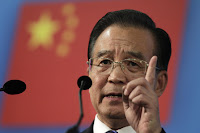 |
| Wen Jiabao (AP) |
Far from a Western conceit, talk of freedom surfaces at every opportunity
One of the worst conceits of modern Sinologists is that China is not like the West, that its people harbor different goals in life, and that freedom isn't one of them. According to that mindset, the Nobel Prize awarded last week to dissident Liu Xiaobo is a meaningless gesture made by foreigners and unreflective of the Chinese people's wishes. Yet when China's leadership signals a tolerance, however slight, for openness, debate about freedom blooms.
That may be what's happening now in the wake of Premier Wen Jiabao's recent statements extolling political reform. Taking the hint, 23 Communist Party elders Monday posted an open letter on the Internet calling for freedom of speech and press. Like the Nobel committee, they ask only for the rights already guaranteed in China's own constitution. They also noted the irony that even the statements of Chinese leaders are sometimes censored on the mainland, and that mainland Chinese don't enjoy the same rights as their peers in Hong Kong and Macau.
On Wednesday mainland newspapers took up the issue, publishing front-page articles on Premier Wen's calls for reform. On Thursday, one paper even ventured an article on the Nobel Prize. This kind of activism isn't as rare as you might think: As China's journalists hone their skills and communicate with each other via the Internet, they have become bolder. In March, 13 newspapers published an open letter calling for the reform of China's dysfunctional system of household registration for migrant workers.
Wednesday's articles are particularly well-timed, given that China's Central Committee starts a three-day meeting Friday and is expected to discuss the country's political and economic direction. The current generation of leadership is a cautious crowd, so no one—not even Premier Wen—is likely to discuss true democratic reform. All the more so given that the transition to the next generation of leaders is only two years away.
Yet if this week's events show anything, it is the increasing tension between one-party rule and the freer flow of information that is producing a better-informed public. The Party's "black hand" censors tried hard this week to block any mention of the Nobel Prize or Mr. Liu from television, print media, the Internet and mobile communication networks. Yet China's savvy citizens, especially its young people, have figured out ways around the firewall, not least by word of mouth.
Perhaps it's this tension that Premier Wen recognized when he said in a speech in Shenzhen in August that China stands at a "great new juncture in history" and "cannot stand still" nor "afford to step backward." If political reform is needed and China wants to chart its own path, then it has to start talking about it—a prospect that horrifies Party elites who have based their careers, personal wealth and family futures on a closed system that rewards cronyism, not competition and achievement.
This is a conversation that China and its people will eventually have, whether the Communist Party wants it or not. The Nobel Prize by itself won't change China, and neither will this week's open letter. What will change China is the common aspiration of its people for freedom.



0 comments:
Post a Comment